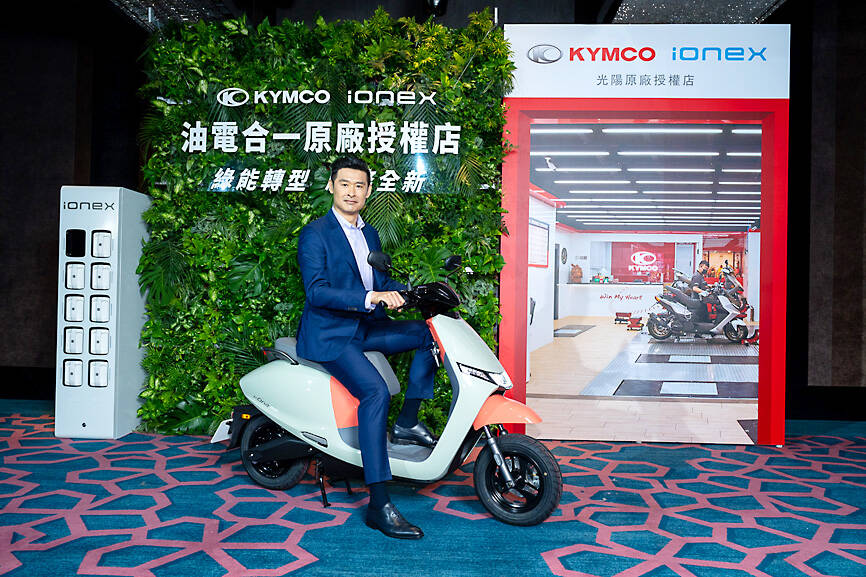Kwang Yang Motor Co (光陽工業), which sells electric scooters under the brand Ionex, is to form a joint venture with PTT Public Co to take its electric scooters and battery-swapping services to Thailand later this year, marking more progress in its strategy to expand its electric-vehicle business overseas.
The Kaohsiung-based manufacturer of scooters has been exploring electric-vehicle business opportunities outside Taiwan after forming a partnership in 2020 with Grab Holdings Inc’s two-wheel sharing-service provider, GrabWheels, by supplying electric two-wheelers.
The company has also been trying to make inroads into India for years, but has yet to report any significant progress.

Photo courtesy of Kwang Yang Motor Co
It is not the first time PTT Public has teamed team up with a Taiwanese company to tap into the electric mobility sector.
Thailand’s biggest petroleum company, PTT Public has a joint venture with Hon Hai Precision Industry Co (鴻海精密) to build electric vehicles in Thailand starting next year.
AIONEX CO
PTT’s board of directors on Wednesday approved the proposal from its fully owned subsidiary Arun Plummeted Co to enter a joint venture agreement and create a joint venture — Aionex Co — with Kwang Yang and its subsidiary KYMCO Capital Private Equity Management Co (金庫資本), a document that the Taipei Times obtained showed.
Arun is to hold a 51 percent stake in the joint venture, while Kwang Yang and KYMCO Capital would own 29 percent and 20 percent respectively.
AMBITION
Aionex would have registered capital of not more than 600 million baht (US$16.95 million) and is to start operating by the end of this year.
It is aiming to become the leader in electric two-wheelers in Thailand and ASEAN.
Aionex’s business scope is to include sales and manufacturing of electric scooters, as well as providing battery-swapping services, it said.
The joint venture is subject to approval by regulatory authorities.

Taiwan Semiconductor Manufacturing Co (TSMC, 台積電) secured a record 70.2 percent share of the global foundry business in the second quarter, up from 67.6 percent the previous quarter, and continued widening its lead over second-placed Samsung Electronics Co, TrendForce Corp (集邦科技) said on Monday. TSMC posted US$30.24 billion in sales in the April-to-June period, up 18.5 percent from the previous quarter, driven by major smartphone customers entering their ramp-up cycle and robust demand for artificial intelligence chips, laptops and PCs, which boosted wafer shipments and average selling prices, TrendForce said in a report. Samsung’s sales also grew in the second quarter, up

LIMITED IMPACT: Investor confidence was likely sustained by its relatively small exposure to the Chinese market, as only less advanced chips are made in Nanjing Taiwan Semiconductor Manufacturing Co (TSMC, 台積電) saw its stock price close steady yesterday in a sign that the loss of the validated end user (VEU) status for its Nanjing, China, fab should have a mild impact on the world’s biggest contract chipmaker financially and technologically. Media reports about the waiver loss sent TSMC down 1.29 percent during the early trading session yesterday, but the stock soon regained strength and ended at NT$1,160, unchanged from Tuesday. Investors’ confidence in TSMC was likely built on its relatively small exposure to the Chinese market, as Chinese customers contributed about 9 percent to TSMC’s revenue last

On Tuesday, US President Donald Trump weighed in on a pressing national issue: The rebranding of a restaurant chain. Last week, Cracker Barrel, a Tennessee company whose nationwide locations lean heavily on a cozy, old-timey aesthetic — “rocking chairs on the porch, a warm fire in the hearth, peg games on the table” — announced it was updating its logo. Uncle Herschel, the man who once appeared next to the letters with a barrel, was gone. It sparked ire on the right, with Donald Trump Jr leading a charge against the rebranding: “WTF is wrong with Cracker Barrel?!” Later, Trump Sr weighed

LOOPHOLES: The move is to end a break that was aiding foreign producers without any similar benefit for US manufacturers, the US Department of Commerce said US President Donald Trump’s administration would make it harder for Samsung Electronics Co and SK Hynix Inc to ship critical equipment to their chipmaking operations in China, dealing a potential blow to the companies’ production in the world’s largest semiconductor market. The US Department of Commerce in a notice published on Friday said that it was revoking waivers for Samsung and SK Hynix to use US technologies in their Chinese operations. The companies had been operating in China under regulations that allow them to import chipmaking equipment without applying for a new license each time. The move would revise what is known